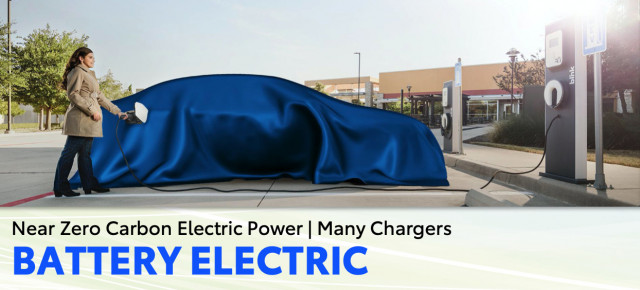Toyota flips switch on electric vehicles, teases new SUV
Toyota plans to sell an electric crossover SUV and electric sedan later this year in the U.S., the automaker announced on Wednesday.
After years of touting hydrogen fuel cell technology over battery electric vehicles (BEV), and decades of being the global leader in hybrid vehicle sales, Toyota’s commitment to its first widely-available electric vehicles for the U.S. market represents a change in course. Yet as it was announcing the fully electric vehicles, it wasn’t doing a strong sell on electric vehicles. It said that plug-in hybrid vehicles (PHEV) such as the 2021 Toyota RAV-4 Prime cost less than BEVs and emit the same amount of greenhouse gases.
“The key point is that a BEV and PHEV can provide similar environmental benefits,” Toyota concluded in its statement, which also included plans for a new PHEV in Toyota’s Prime series.

Toyota U.S. electrified vehicles presentation – February 2021
Much of that conclusion is based on the source of electricity powering plug-in cars, or in other words, the grid. Yet the Union of Concerned Scientists estimates that in nearly every sector in the U.S., driving an electric vehicle produces less emissions than driving a 50-mpg gasoline car, according to Green Car Reports. Moreover, the U.S. electricity grid keeps getting cleaner as renewable energy takes over a small but growing percentage of the fossil fuel share. So with PHEVs, the rate of emissions depend on how much gas you use and how much electricity.
Toyota’s stance seems to undermine its bold plan of having 40% of new models sold in the U.S. by 2025 powered in some part by electricity, and 70% by 2030. Electrification applies to any vehicle with a battery-powered propulsion source, so hybrid vehicles (HEV) such as the Toyota Prius, 2021 Toyota Venza, and 2021 Toyota Sienna minivan count toward that target. The Venza crossover and redesigned family hauler come standard as hybrids, and the Sienna gets an excellent EPA-rated 35 mpg combined with all-wheel drive.
In addition to those three models, Toyota already sells hybrid versions of the Avalon full-size sedan, Camry mid-size sedan, Corolla compact sedan, RAV4 compact crossover, and Highlander three-row SUV.
Toyota’s current Prime series of plug-in hybrids includes the 2021 Prius Prime as well as the excellent 2021 RAV4 Prime with 42 miles of electric range. Toyota also sells the Mirai hydrogen fuel-cell electric vehicle (FCEV), but it’s limited to certain areas of California near public hydrogen filling stations.

What is this Toyota electric car?
Under that broad umbrella of electrification, it’s easier to see Toyota reach those goals even without the three new models. Toyota says it has more than 40% share of the alternative fuel vehicle market, and 64% share of hybrids and plug-in hybrids. Yet it has 0% share of the booming BEV segment.
That’s why it is developing a platform dedicated to EVs. The new electric SUV most likely will be the model teased for Europe in December as part of a joint venture with Subaru, who will also sell its first BEV. Previously, the automakers worked together on the Toyota 86 and Subaru BRZ affordable sports cars.
It remains to be seen whether the electric sedan will be distinct or based on an existing model; it would make sense to offer an electric Prius to keep that name relevant for the next evolution of electrification. The new plug-in hybrid Prime model will most likely be a crossover SUV, and Toyota has an opening in the small crossover space currently occupied by the underwhelming C-HR. It certainly won’t be a Land Cruiser.

